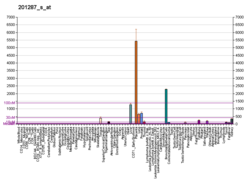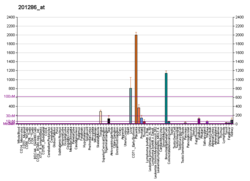Syndecan 1 is a protein which in humans is encoded by the SDC1 gene.[5][6] The protein is a transmembrane (type I) heparan sulfate proteoglycan and is a member of the syndecan proteoglycan family. The syndecan-1 protein functions as an integral membrane protein and participates in cell proliferation, cell migration and cell-matrix interactions via its receptor for extracellular matrix proteins. Syndecan-1 is a sponge for growth factors and chemokines,[7] with binding largely via heparan sulfate chains. The syndecans mediate cell binding, cell signaling, and cytoskeletal organization and syndecan receptors are required for internalization of the HIV-1 tat protein.
Altered syndecan-1 expression has been detected in several different tumor types. Syndecan 1 can be a marker for plasma cells.
- ^ a b c GRCh38: Ensembl release 89: ENSG00000115884 – Ensembl, May 2017
- ^ a b c GRCm38: Ensembl release 89: ENSMUSG00000020592 – Ensembl, May 2017
- ^ "Human PubMed Reference:". National Center for Biotechnology Information, U.S. National Library of Medicine.
- ^ "Mouse PubMed Reference:". National Center for Biotechnology Information, U.S. National Library of Medicine.
- ^ Mali M, Jaakkola P, Arvilommi AM, Jalkanen M (April 1990). "Sequence of human syndecan indicates a novel gene family of integral membrane proteoglycans". The Journal of Biological Chemistry. 265 (12): 6884–6889. doi:10.1016/S0021-9258(19)39232-4. PMID 2324102.
- ^ Ala-Kapee M, Nevanlinna H, Mali M, Jalkanen M, Schröder J (September 1990). "Localization of gene for human syndecan, an integral membrane proteoglycan and a matrix receptor, to chromosome 2". Somatic Cell and Molecular Genetics. 16 (5): 501–505. doi:10.1007/BF01233200. PMID 2173154. S2CID 43270934.
- ^ Götte M (April 2003). "Syndecans in inflammation". FASEB Journal. 17 (6): 575–591. doi:10.1096/fj.02-0739rev. PMID 12665470. S2CID 16948257.





